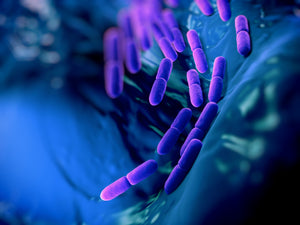How Do Probiotics Work?
September 07, 2015

Gut microbes – you have trillions of them nestled inside your intestinal tract. Each of us has a slightly different population of microbes in our guts that serve as our unique gut “fingerprint,” also known as our intestinal ecosystem. A growing body of research shows that bacteria, both good and bad, play a key role in digestive and immune health.
Your ecosystem, made up of a diverse array of bacteria, is dynamic with the capacity to change for the better but also capable of being disrupted by factors such as diet, stress, and certain medications. Slowly, researchers are gaining knowledge as to how gut bacteria interact with each other and precisely how the right probiotic, gut-friendly bacteria, offer health benefits. Let’s look at some of the ways selected super strains of probiotic bacteria can keep your intestinal tract and body in balance.
Probiotic Bacteria Keep The “Bad Guys” In Check
Some gut-friendly, super strains of probiotic bacteria make it harder for infection-causing bacteria to gain a foothold in your body. All bacteria need resources, especially nutrients. When a diverse, thriving population of “good” bacteria take up residence in your gut, the bad guys have a hard time competing. It’s like opening a grocery store in a market already saturated with grocery stores. If you’re the new guy on the block, you’ll have a hard time competing. To make it even more challenging for the bad bacteria that want to move in, some super strains of probiotic bacteria produce chemical compounds such as hydrogen peroxide (H2O2) and bacteriocins that thwart the growth of bad bacteria. So having plenty of good gut bacteria works in your favor.
One health benefit probiotic bacteria offer is they keep the lining of your intestinal tract healthy. The cells that line your intestinal tract, including your colon, depend upon a steady supply of energy to function properly. When you eat foods high in indigestible fiber, probiotic bacteria in your gut convert this fiber, that would otherwise pass right through you, into short-chain fatty acids. Cells that line your colon can use these special fats to produce the energy they need to help keep your colon lining healthy. The same short-chain fatty acids make the colon more acidic, which makes it harder for bad bacteria to grow and thrive.
Bacteriabacteria And Your Immune System
Another way probiotic bacteria offer benefits is by their impact on your immune system. More than 70% of your immunity, your primary defense against infection, lies in your gut and probiotic bacteria help keep this portion of your immune system balanced. These hearty bacteria also aid in preserving the integrity of your intestinal tract. The lining of your small intestine is only one cell layer thick and prone to damage. Taking certain medications, a poor diet, and even stress can damage this thin, fragile lining. When this happens, food and bacteria can enter your bloodstream and potentially cause problems. Probiotic bacteria help keep this lining healthy and intact.
Other Ways Probiotic Bacteria Are Helpful
Another reason to get excited about probiotic bacteria is they help you better absorb minerals like calcium, magnesium and zinc you take in through your diet. What counts from a health standpoint is whether the minerals you take in through your diet or supplements actually make it into your bloodstream. Probiotic bacteria give you a “leg up” on mineral absorption.
Probiotic bacteria can also communicate with other probiotic bacteria through unique communication mechanisms that scientists are only beginning to understand, they can facilitate the growth of other good gut bacteria. Having friendly gut bacteria around helps recruit other “good guys” to the neighborhood – so you get the benefits of a healthier gut.
As you can see, bacteria are pretty clever. That’s why it’s so important to maintain a healthy gut ecosystem.
The post How Do Probiotics Work? appeared first on Natren Probiotics Blog.





Leave a comment